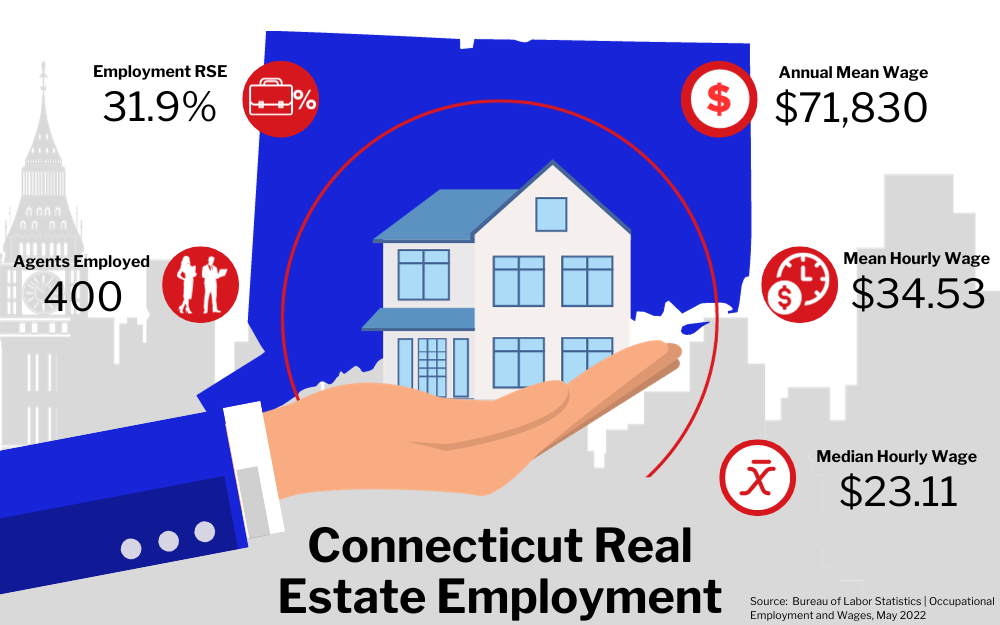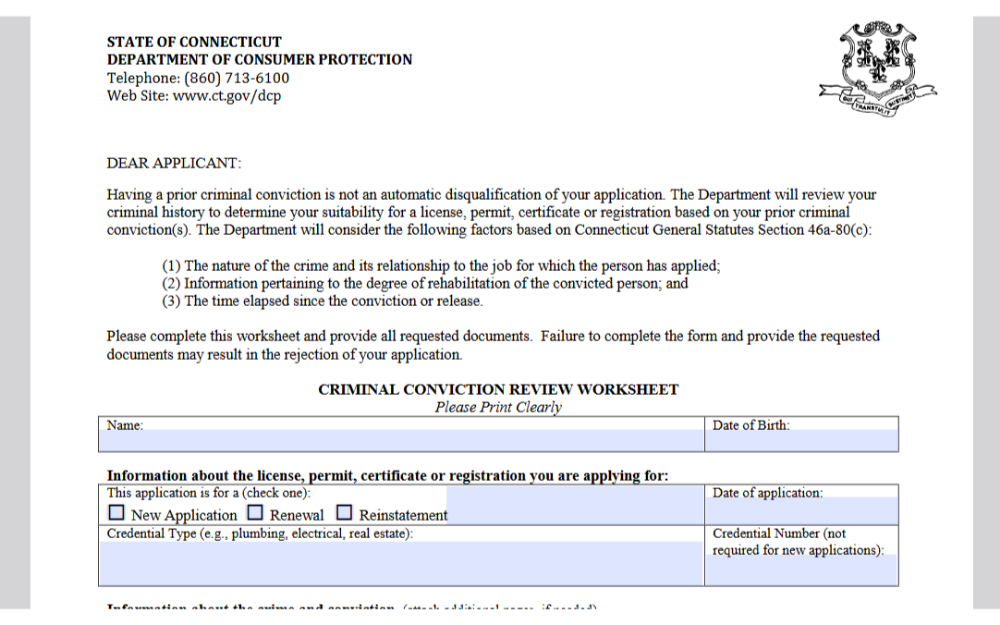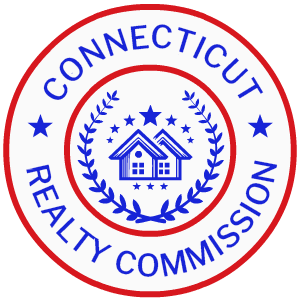
Buying or selling a piece of property can feel overwhelming for the average person.
Not only are there countless properties to select from—or an endless number of potential buyers for your property if you are a seller—but there’s also a significant amount of work that comes after the property selection has been made. This includes everything from managing the title transfer, handling financial transactions, and wading through what can seem like a mountain of paperwork throughout the process.
The good news is that there are industry professionals trained to guide buyers and sellers through this complex process. Known as real estate agents, they help connect buyers and sellers, make sure all paperwork is completed correctly, and try to make the process as seamless as possible for their clients.
To ensure real estate salespeople are equipped to handle the job, the state of Connecticut requires them to be licensed. Licensing is handled at the state level and is designed to give buyers and sellers peace of mind when choosing an agent.
If you’re interested in a career in real estate, this article provides simple guidance for meeting all education and licensing requirements set by the state of CT.
Connecticut Professional Real Estate License
Compared to many other states, the list of requirements for real estate licensing in CT is fairly minimal. Applicants must complete just four basic tasks, which include:
- Heading back to school to attend a real estate class
- Passing an exam with a score of 70 percent or higher
- Filling out an application, which can be found online
- Paying an annual license fee
Essential Conditions for Real Estate Professional Licensing
The Connecticut real estate license application process is managed by the state’s Department of Consumer Protection (DCP). DCP partners with a private testing organization called PSI Services LLC (PSI).
Though PSI is not a government agency, this organization works together with DCP to help CT real estate agents obtain their licenses.
All applicants hoping to earn a real estate license in Connecticut must go through the same basic steps,1 which include:
- Take a real estate class approved by the state2
- Complete the application for a new real estate salesperson license.3 You can find this application on PSI’s website.
It is not available on the state’s government website, as the state has authorized PSI to review and manage all of these applications in their place. - Take the Connecticut Salesperson Real Estate Licensing exam, which consists of two parts.
- Once the applicant has passed the exam, they should forward the exam scoresheet and license fee to the DCP Licensing Services division, which will grant the license. This can be done in two ways – either by mail or by email.
- Address for Licensing Services:4
Connecticut Department of Consumer Protection
450 Columbus Boulevard,
Suite 801 Hartford, CT. 06103 - Phone: 860-713-6000
- Email address for Licensing Services: [email protected]
- Address for Licensing Services:4
Obligatory Age and Elementary Schooling Criteria
All real estate agents seeking licensing in Connecticut must be 18 by the time they receive a license, but may begin real estate coursework and the licensing exam before turning 18. While there are real estate-specific courses all applicants must take before applying for a license, the state does not require real estate agents to have a high school diploma or GED.5
Potential applicants may wonder about brokerage sponsorship, which is required for real estate agents in some states. In CT, new sales agents don’t need a broker to sponsor them when applying for the license and sitting for the exam but will need a sponsorship before picking up the approved license and acting on behalf of clients.
Necessary Pre-License Education Hours
Before submitting an application, all future agents must attend real estate pre-license courses. This is a specific program developed by the CT Department of Consumer Protection and offered at community colleges, job training centers, and private education facilities statewide.
A full list of authorized programs can be found on their website.5
Expenses for Pre-Licensing Education in Real Estate School
The price for pre-licensing education in real estate schools in Connecticut can vary depending on where you decide to take the course. Some specialty training locations offer this 60-hour program, including all books and required materials, starting at around $500.2
Many CT community colleges also offer real estate training. Depending on the policies at local colleges in your area, the cost of this program can vary.
For example, some junior colleges may offer reduced tuition for local residents, while others may have special payment plans and other options to make the program more affordable.
Mandatory Real Estate Background Inquiry (Fingerprint Office Locations)
While some states require applicants to undergo fingerprinting and background checks before obtaining a real estate license, Connecticut does not have this requirement.6 Instead, the state requires applicants to complete a Criminal Conviction Application Worksheet while filling out the licensing application.3

This worksheet includes areas to report any of the following convictions:
- Any felony convictions
- Misdemeanor convictions related to financial crimes, conspiracy, or related charges
- Obtaining money under false pretenses
- Forgery
- Embezzlement
While everyone completing the real estate license application must disclose these charges, the state doesn’t ban anyone from getting a license just because of their criminal background. Instead, the Connecticut Real Estate Commission will examine each applicant’s history and make decisions on whether to grant a license.
That means that those with a felony conviction, expungement, misdemeanor, or any other criminal background can still apply for a license.
References
1CT.GOV. (2023). Real Estate Salesperson – Initial/Exam. CT.gov. Retrieved October 27, 2023, from <https://portal.ct.gov/DCP/License-Services-Division/All-License-Applications/Real-Estate-Salesperson---InitialExam>
2Academy of Professional Education. (2018). Real Estate Practices and Principles POLICIES & PROCEDURES. The Academy of Professional Education. Retrieved October 27, 2023, from <https://www.realestateedct.com/course-information>
3PSI Services, LLC. (2023). Connecticut Real Estate. PSI | State of Connecticut Department of Consumer Protection. Retrieved October 27, 2023, from <https://ct-app.psiexams.com>
4PSI Services LLC. (2023, October 1). SALESPERSON REAL ESTATE LICENSING CANDIDATE INFORMATION BULLETIN [PDF]. PSI Services LLC. Retrieved October 27, 2023, from <https://candidate.psiexams.com/bulletin/display_bulletin.jsp?ro=yes&actionname=83&bulletinid=50&bulletinurl=.pdf>
5CT STATE COMMUNITY COLLEGE NAUGATUCK VALLEY. (2023). REAL ESTATE. CT State Community College Naugatuck Valley. Retrieved October 27, 2023, from <https://nv.edu/academics/workforce-education/non-credit-workforce-development-training-courses/real-estate>
6CT.GOV. (2023). Real Estate Online Application Instructions. CT.gov. Retrieved October 27, 2023, from https://portal.ct.gov/DCP/License-Services-Division/All-License-Applications/Real-Estate-Online-Application-Instructions
7State of Connecticut. (2024). Criminal Conviction Review Workheet. Department of Consumer Protection. Retrieved April 12, 2024, from <https://portal.ct.gov/-/media/dcp/agency-administration/documents/chro-review-of-criminal-conviction-form-pdf.pdf>
